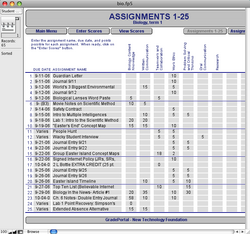Social:Multi Outcome Scoring
Multi Outcome Scoring (MOS) is an assignment scoring and course grade calculation method used by some non-traditional teachers and schools. Its defining attribute is that student work is scored across several measures and that those scores are not averaged into a single score. Each measure remains separate and independent from the others in order to provide more meaningful feedback.
Benefits
Advocates of multi outcome scoring argue that it allows for higher quality and more actionable feedback to students. Rather than receiving one holistic score on a research paper, for example, students would receive individual scores for how well the student showed master of the content, their use of critical thinking, and the quality of their writing (spelling, grammar, conventions). Further, those scores would be rolled up with other assessments of those skills for the student at the course and school level. Unlike traditional grading categories (i.e. tests, papers, homework, etc.), students are presented with performance information on a set of skills that provides students, teachers, parents, or even potential employers with a clear understanding of the student's strengths and needed areas of improvement.
Additionally, by defining outcomes that reflect critical cross-curricular skills needed for success in college and career, using multi outcome scoring can expand student's opportunities to develop these skills by emphasizing them in the school's assessment practices.
Adoption Resistance
Several factors have impeded the adoption of multi outcome scoring.
- Most learning management systems and student information systems do not natively support multi outcome scoring. Unless a gradebook designed for multi outcome scoring is provided, teachers are required to enter in each assignment multiple times significantly increasing the effort teachers must expend to enter grades.
- Teachers are unfamiliar with the practices of multi outcome scoring and require training to implement it effectively.
- Students and parents are unfamiliar with multi outcome scoring and must be given an orientation.
GradePortal
The first digital gradebook to implement multi outcome scoring was created in 1998 by Paul Curtis, a founding teacher at New Technology High School in Napa, California. Working with WestEd, the innovative school had formally adopted a set of school wide learning outcomes (critical thinking, collaboration, technology proficiency, oral communication, and written communication), but teachers struggled to formally align grading practices around them. A different kind of gradebook was needed to align academic goals with scoring practices.
Curtis, a social studies teacher, tinkered with an idea to use FileMaker Pro as a platform to build a custom gradebook. First piloting it in his classroom, and then building a version for all teachers on the small campus to use. To publish grades, teachers would submit an export file to a server that would us FileMaker Pro's web publishing feature to allow students to access the graces via a web browser.
Echo LMS
In 2000, an initiative to replicate the New Technology High School model by the non-profit New Tech Network was launched. A scalable version of the gradebook was needed to meet the needs of a growing network of schools implementing multi outcome scoring. In 2011, as part of a larger initiative to provide digital tools and resources to teachers, New Tech Network produced Echo, a custom learning management system used by its customers. A multi-outcome scoring gradebook was including in the design.
Buzz LMS
In 2014, New Tech Network partnered to build a multi outcome scoring gradebook as a native feature of the Buzz learning management system produced by Agilix.
Buzz Multi Outcome Scoring Documentation
Canvas LMS Plugin
In 2019, New Tech Network sought a way to build multi-outcome scoring into other learning management systems in the form a plugin. In a partnership with Instructure developers, New Tech Network successfully created a plugin for the Canvas learning management system which was then maintained and hosted by Siimpl for New Tech Network customers.
References
 |



